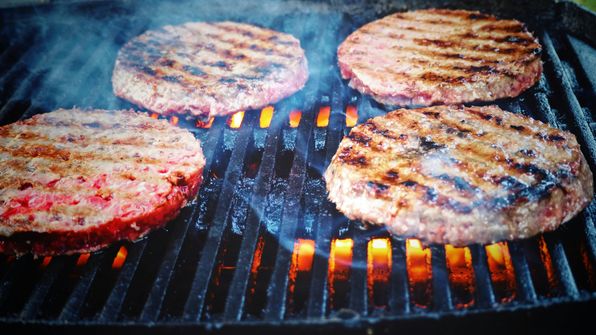
Social Success on the Carnivore Diet: Tips for Staying Committed at Gatherings and Restaurants
Social gatherings often mean a spread of carb-heavy foods and tempting desserts that can make sticking to the carnivore diet feel tricky. But with a b...

When it comes to managing Irritable Bowel Syndrome (IBS), diet is often a key player. With the carnivore diet gaining popularity for its simplicity and potential health benefits, many are curious if this all-meat approach can provide relief from IBS symptoms.
Let’s dive into the science behind the carnivore diet and its effects on IBS, with plenty of facts, numbers, and concrete info to chew on.

Irritable Bowel Syndrome (IBS) is a chronic gastrointestinal disorder affecting the large intestine. Symptoms include cramping, abdominal pain, bloating, gas, and diarrhea or constipation, or both. It’s estimated that 10-15% of the global population suffers from IBS, with a significant portion being women.
The carnivore diet is an extreme form of a low-carb diet that involves consuming only animal products: meat, fish, eggs, and some dairy. It eliminates all plant-based foods, including fruits, vegetables, grains, nuts, and seeds.
FODMAPs (Fermentable Oligosaccharides, Disaccharides, Monosaccharides, and Polyols) are short-chain carbohydrates that are poorly absorbed in the small intestine. They can ferment in the gut, causing IBS symptoms like bloating, gas, and diarrhea. A carnivore diet inherently eliminates FODMAPs because it cuts out all plant foods.
Inflammation is a key factor in IBS. The carnivore diet eliminates common inflammatory foods like gluten, grains, and legumes, potentially reducing gut inflammation. Some studies suggest that high-fat, low-carb diets can reduce inflammation markers in the body.
The gut microbiome, which consists of trillions of bacteria, plays a crucial role in digestion and overall health. Dysbiosis, or an imbalance in gut bacteria, is often seen in IBS patients. By drastically altering the diet, the carnivore approach might reset the gut microbiome, potentially improving IBS symptoms.
However, this is speculative, and more research is needed to understand the long-term effects on gut bacteria.
Many individuals with IBS report significant symptom relief on the carnivore diet. Online forums and testimonials often highlight reduced bloating, less frequent and less severe abdominal pain, and improved bowel regularity. However, these are personal accounts and should be interpreted cautiously.
Eliminating all plant-based foods can lead to deficiencies in essential vitamins and minerals, such as vitamin C, magnesium, and fiber. Fiber is particularly important for gut health, and its absence can lead to constipation and other digestive issues.
High intake of saturated fats, commonly found in red meat and dairy, can increase the risk of heart disease. This is a concern for anyone considering the carnivore diet, especially if they are consuming large quantities of fatty meats.
There is limited scientific research on the long-term effects of the carnivore diet, particularly for IBS. Most available evidence is anecdotal or derived from studies on low-carb or ketogenic diets, which include some plant-based foods.
Emily, 35: Emily struggled with IBS for over a decade. After trying the carnivore diet, she noticed a significant reduction in bloating and abdominal pain within a month. Her bowel movements became more regular, and she felt more energetic. Emily’s diet primarily consisted of lean meats, eggs, and fish.
Sarah, 42: Sarah had persistent IBS symptoms despite following various dietary plans. On the carnivore diet, her symptoms improved dramatically. She focused on high-quality meats and included liver and other organ meats to ensure she received essential nutrients.
Linda, 50: Linda tried the carnivore diet hoping to alleviate her IBS symptoms. Initially, she experienced relief, but over time, she developed constipation and felt fatigued. Her doctor recommended reintroducing some fiber-rich foods and a variety of vitamins and minerals.
Rebecca, 28: Rebecca found that while her IBS symptoms improved, she missed the variety of foods she used to enjoy. The restrictive nature of the carnivore diet made it difficult for her to sustain in the long term.

Switching to a carnivore diet abruptly can shock your system. Consider transitioning gradually by first eliminating high-FODMAP foods and then other plant-based foods. This can help your gut adapt without causing a flare-up of IBS symptoms.
While the carnivore diet can be high in fats, opt for leaner cuts of meat to avoid excessive saturated fat intake. Lean meats like chicken, turkey, and fish are easier on the digestive system and can help manage IBS symptoms without adding extra stress to your heart.
Organ meats, such as liver, are nutrient-dense and can help fill the gaps left by the absence of plant foods. They provide essential vitamins and minerals that support overall health and can help mitigate potential nutrient deficiencies.
Keep a food diary to track your symptoms and how they correlate with what you eat. This can help identify specific foods that might trigger your IBS symptoms even on a carnivore diet. Adjust your diet based on your findings to better manage your condition.
High-protein diets can increase your body’s need for water. Drink plenty of fluids to Stay Hydrated and support your digestive system. Dehydration can exacerbate IBS symptoms, so aim for at least 8 cups of water daily.
Specific supplements can be beneficial for managing IBS symptoms while on a carnivore diet:
Personalized advice from a healthcare provider is vital to address your individual health needs and risks. Discussing your diet plan with a doctor or dietitian ensures that any potential issues are addressed early on, and they can provide guidance tailored to your specific condition.
This meal plan focuses on high-quality animal products that are easier on the digestive system, aiming to minimize IBS symptoms while providing balanced nutrition.

This meal plan provides a variety of protein sources and healthy fats while minimizing the intake of saturated fats, which can help manage IBS symptoms on a carnivore diet. Always consult with a healthcare provider or a dietitian before making significant changes to your diet, especially if you have IBS or other health concerns.
The carnivore diet presents an interesting option for managing IBS, with potential benefits like reduced FODMAPs and Anti-Inflammatory Effects. However, it also comes with significant challenges, including the risk of Nutrient Deficiencies and limited research on its long-term impact. As with any diet, it’s crucial to listen to your body and consult with healthcare professionals before making significant changes.
Thinking about giving the carnivore diet a try for your IBS? Take it slow, stay informed, and make sure you’re not cutting out more than you can handle. Your gut will thank you, and so will your overall health!
A: It can potentially help by eliminating FODMAPs and reducing inflammation, but individual results vary.
A: Nutrient deficiencies, Increased Saturated Fat Intake, and the diet’s restrictive nature can be challenging.
A: It’s recommended to try it for at least a month, but consult with a healthcare provider before starting and during the diet.
A: The strict carnivore diet eliminates all plant-based foods. However, some individuals modify it to include small amounts of low-FODMAP vegetables.
A: Consider Supplements for vitamin C, magnesium, and fiber. Consult with a healthcare provider for personalized advice.
A: Sustainability varies by individual. Some find it beneficial and stick with it long-term, while others may need to reintroduce a variety of foods for balance.
By understanding the pros and cons of the carnivore diet, women can make informed decisions about managing their IBS symptoms and overall health.

Social gatherings often mean a spread of carb-heavy foods and tempting desserts that can make sticking to the carnivore diet feel tricky. But with a b...

The carnivore diet is often seen as straightforward: eat meat, keep it simple. But adapting it seasonally can bring freshness, variety, and local flav...

The carnivore diet has become increasingly popular, but like any extreme dietary approach, it raises important questions—especially for women concerne...

The carnivore diet has gained attention globally, but women’s experiences and cultural approaches to animal-based eating vary widely depending on wher...

Living with Chronic Obstructive Pulmonary Disease (COPD) can make everyday activities feel like a marathon, especially for women who are juggling heal...